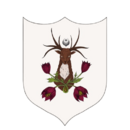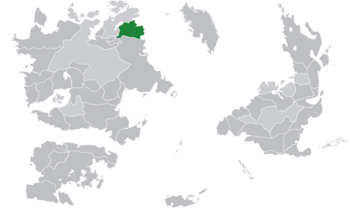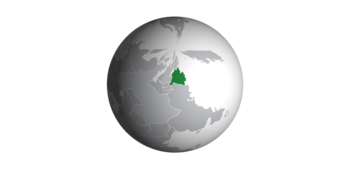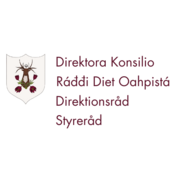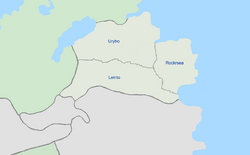Entropan
Entropanian Commonwealth Demokrata Federacio de Entropano (Esperanto) Demokratiske Føderasjonen Entropan (Leintan) Oqartussaassuseqarnerup Naalagaaffeqatigiinnera Entropi (Absi) | |
|---|---|
Motto: "Libereco, Egaleco, Solidareco" "Liberty, Equality, Solidarity" | |
Anthem:
| |
| Capital and largest city | Maledonia |
| Most Spoken Languages | Sebukel, Leintan, Rockr, Uryha, Quebecshirite |
| Ethnic groups |
|
| Religion (2022 census) | |
| Demonym(s) | Entropanian |
| Government | Participatory polity Direct democracy |
• Chairperson | Håkon Martinsen |
| Legislature | National Council |
| Population | |
• 2021 estimate | |
• 2019 census | 24,568,908 |
| GDP (PPP) | 2019 estimate |
• Total | ₵1,162,683,356,460 credits |
• Per capita | ₵46,533 credits |
| GDP (nominal) | 2019 estimate |
• Total | ₵1,223,149,987,080 credits |
• Per capita | ₵48,932 |
| Gini (2021) | 5.7 low · 2nd |
| HDI (2021) | very high · 3rd |
| Currency | Felco (FLC) |
| Time zone | AMT |
| Driving side | left |
| Calling code | +19 |
| Internet TLD | .en |
EVERYTHING IN THIS PAGE IS OUTDATED. I'LL WORK ON IT WHEN I CAN BE ARSED THANK YOU
Entropan, officially the Entropanian Commonwealth (Esperanto: Demokrata Federacio de Entropano, Leintan: Oqartussaassuseqarnerup Naalagaaffeqatigiinnera Entropi, Rockr: Demokratiske Føderasjonen Entropan) is a country in northern Ecros, bordered by Tirol and Quebecshire to its south, the Vernier Sea to its east, and ungoverned land to its west and north. Entropan covers an area of 1,971,968 square kilometres (761,381 sq mi), with a population of 24.5 million. Entropan is a constitutional federation separated into three distinct areas, being the regions of Uryho, Rockrsea, and Leinto, with each region being culturally and linguistically different. Entropan's climate varies from a humid continental in the south and boreal in the north.
Entropan was first inhabited around 5000BCE by migrants from Reykanes towards the end of the Ice Age as the volcanos Hekla and Katla erupted, those migrants developing into the Uryha and Rockr cultures, and received migrants who migrated northward following the collapse of the Ayeroshubic Kingdom, those migrants developing into the Leinta culture. In the times following, the three cultures in prehistoric Entropan developed into the Kingdom of Leinta, the Kingdom of Rockrsea, and the Uryha Republic. Tensions between these three territories began to rise around the 12th century, culminating in the War of the Three Territories, which resulted in a Leintan victory and the Treaty of Unification, forming the modern borders of Entropan. The newly formed Kingdom of Entropan was stable for the next few hundred years, but the advent of radical groups such as the Republicans and the Perist Catholics saw the country descend into civil war, the civil war lasting until 1607 where the Republicans won and the Unitary Republic of Entropan established. This republic lasted relatively stably until groups such as the far-right Heavenly League and the far-left Common Association rose, and eventually started their own independent rebellions, causing the Second Entropanian Civil War.
After the Second Civil War ended in 1801, Entropan experienced a period of collapse, wherein over 50 separate city-states were formed, of various political and religious beliefs, including cults, totalitarian theocracies, and anarchist confederations, mainly due to the fall of the Common Association and Heavenly League that left the populace aimless. After over 4 decades of collapse, a group called the New Republicans, the ruling party of the Parliamentary Republic of Entropan, began to wage war on the other city-states, the end coming in 1853, where the Parliamentary Republic gained full control over Entropan, and declared the Second Republic of Entropan.
The Second Republic of Entropan saw an end to the instability earlier seen, with Quebecshirite industrialisation reaching Entropan and beginning to develop strategic oil and natural gas industries, off of which Entropan developed into a new stability, quickly becoming a wealthy country. However, this came with rising inequalities due to monopolisation and a lack of laws protecting workers' rights, which spiralled into the Chartist Movement, a movement with a set of 10 demands for larger governmental intervention into the economy, and new protections for workers' rights. This Chartist movement grew to be very successful, due to the 1907 general strike called, sympathetic MPs, and their successful promotion of a unifying message between the three culturally distinct regions of Entropan, through the Esperanto project proposed by prominent member Kiistaaraq Imina.
The twentieth century saw a period of large-scale development for Entropan, with the [[Social Democratic Party (Entropan)|Social Democratic Party), first elected into government in 1916, ruling for over 40 years, over which their industrial policy efforts saw Entropan rapidly develop, through embryonic welfare states and the establishment of major governmental services becoming a world leader in quality of life. In the 1960s, economic stagnation caused new movements, such as the laissez-faire Free Liberals and the liberal socialist co-operatists, to dominate popular politics. The election of a co-operatist Prime Minister, Aqquala Holsen, caused the co-operatists to rule Entropan for a decade, ruling again in the 2010s with the recently-grown Progressive Socialist Party, in which the traditionally dominant oil and natural gas industries declined, in favour of developing to a post-industrial service and information economy, with heavy investment in renewable energies ensuring Entropanian economic development.
The rise of the Participatory Movement, headed by Håkon Martinsen, caused a landslide victory for the Progressive Socialists in 2017, after which they held referendums on various parts of a wider Participatory Transition, with a new government heavily devolved and highly encouraging of citizen participation, and new promises of furthering the then-73% of the economy consistent of co-operatives.
Entropan today is a highly developed country, ranking extremely highly in international rankings of healthcare, human development, civil rights, stability, education, lifespan, democracy, eco-friendliness, media and press freedoms, average incomes, among others. Entropan is a member of EEFTA, the Terraconserva Council of Nations, Prosperity of 7, and Global ACES. Its economy has successfully diversified from oil and gas exports to becoming a quaternary and quinary economy focused on academic and creative arts, with tertiary supplementation of a thriving tourism industry, and an industrial base of renewable energy production and aquaculture to back those industries up.
Contents
- 1 Etymology
- 2 History of Entropan
- 2.1 Reykani Migration (5000BCE-3000BCE)
- 2.2 Quebecshirite Migration (2000BCE-1000BCE)
- 2.3 The Three Territories (1000BCE-1175)
- 2.4 The War of the Three Territories (1175-1204)
- 2.5 Kingdom of Entropan (1204-1592)
- 2.6 = Maledonia Rebellion (1489-1591)
- 2.7 Entropanian Civil War (1592-1608)
- 2.8 Unitary Republic of Entropan (1608-1793)
- 2.9 Second Entropanian Civil War (1793-1801)
- 2.10 Collapse of the Entropanian Republic (1801-1853)
- 2.11 Second Republic of Entropan (1853-2022)
- 2.12 Entropanian Commonwealth (2022-present)
- 3 Politics and government
- 4 Geography
- 5 Economy
- 6 Demographics
- 7 Culture
- 8 Notes
Etymology
The name "Entropan" originated form a word in Old Leintan, "Entropi", roughly translated to "beauty". However, the word Entropi has multiple ways of being used in Old Leintan scripts, with uses varying from factually describing deliberative processes, to describing conventional beauty aesthetics, particularly pertaining to nature.
History of Entropan
Reykani Migration (5000BCE-3000BCE)
Quebecshirite Migration (2000BCE-1000BCE)
The Three Territories (1000BCE-1175)
The War of the Three Territories (1175-1204)
The Treaty of Unification (1204)
Kingdom of Entropan (1204-1592)
= Maledonia Rebellion (1489-1591)
Entropanian Civil War (1592-1608)
Rockr War of Independence (1595-1601)
Unitary Republic of Entropan (1608-1793)
Second Entropanian Civil War (1793-1801)
Collapse of the Entropanian Republic (1801-1853)
Second Republic of Entropan (1853-2022)
Industrialisation
Entropanian Commonwealth (2022-present)
New Democratic Constitution
Politics and government
Entropan is considered to be one of the most developed democracies and states of justice in the world. Since 2020, Entropan has been classified as the world's most democratic country by the Democracy Index.
Entropan is a constitutional republic and a parliamentary semi-direct democracy. It is a decentralised, federal state, wherein sovereignty, constitutionally, lies in the decisions of the populace. The National Council is made up of delegates elected through mixed-member proportional representation in the nation's 65 provinces, with it consisting of 615 of these Members of the National Council (MNKs), being headed by the Directorial Council, the constitutional executive .
Entropan has historically has an uncodified constitution, consistent mainly of disparate written sources, including legislative statutes, case law, constitutional conventions, and international treaties, but, in 2020, the ratification of the New Constitution meant that the majority of the principles underlying this uncodified constitution, such as the rule of law, democracy, and the right to freedom of speech, were codified into this new document. This New Constitution serves as Entropan's supreme legal document, with it establishing the new structure and responsibilities of the varying layers of government, as well as their relationships.
National Council

The National Council is the national government of Entropan. It is consistent of 615 delegates, elected via mixed-member proportional representation from the country's 65 provinces. Despite the significant devolution and powers of petition in Entropan causing the majority of politics to happen at lower levels of government, the National Council still has several reserved powers:
- Foreign affairs: the ability to declare war, approve treaties, provide foreign aid, declare positions on international issues, and join alliances;
- Housing and infrastructure: the ability to set national zoning laws and other planning regulations, and provision for nationwide infrastructure, overruling local authorities on the basis of national or local need;
- Defence: the ability to resource the military and decide its priorities;
- Constitution: the ability to propose amendments for the Constitution, then voted on by public referendum;
- Trade and development: the ability to negotiate trade deals, impose sanctions, and overrule decisions of the Foreign Development Bank of Entropan;
- Finance: the ability to determine the structure and function of the National Bank of Entropan, the recognised currency of Entropan, and significant parts of fiscal, economic, and monetary policy;
- Regulation: the ability to set laws regarding copyright and intellectual property, import and export control, consumer protection, product standards, product safety, competition law, health and safety, and most other such regulations of businesses and financial matters;
- Employment: the ability to set laws regarding industrial relations, employment targets (including the National Job Guarantee);
- Broadcasting: the ability to set the structure of funding regarding the Entropanian Broadcasting Corporation;
Directorial Council
The Directorial Council is a collegial body of, usually, twelve members, elected for a four-year term by the National Council, which also oversees the Directorial Council. Each member of the Directorial Council is the head of a governmental administration. The Chairperson of the Council is elected by the National Council from the members of the Directorial Council, usually being the head of the largest political party in the National Council, with elections occuring every year, usually as reconfirmation, except in the first elections after a general election. The Chairperson is a primus inter pares, having no additional powers, remaining the head of a department within the administration.
Since the transition towards this system with the ratification of the New Constitution in 2020, the government has been a coalition of the main political parties, with their share of the seats in the council roughly reflecting their share of the electorate and their representation in the National Council. In the aftermath of the 2022 General Election and the subsequent initial Confirmation of the Directorial Council's composition, the twelve seats in the Directorial Council were distributed as follows:
- 1 seat for the National Party of Rockrsea (NPR);
- 2 seats for the Conservative Party (KP);
- 2 seats for the Green Party (VP);
- 2 seats for the Social Democratic Party (PSD);
- 2 seats for the Social Liberal Party (PSL);
- 3 seats for the Progressive Socialist Party (PPS), including the Chairperson.
The governmental administrations these members of the Directorial Council oversee are:
- Department of the Economy;
- Department of Energy Security and the Environment;
- Department of Education;
- Department of Justice and Police;
- Department of Transport, Infrastructure, and Housing;
- Department of Culture, Media, Sport, and Communications;
- Department of Foreign Affairs and Tourism;
- Department of Health and Social Care;
- Department of Equalities, Youth Affairs, and the Chancellery;
- Department of the Environment, Food, and Rural Affairs;
- Department of Social Welfare and the Citizenship Guarantee;
- Department of Science, Innovation, and Technology;
Administrative divisions
The geographical division of Entropan into disparate provinces and counties began in the early 13th century, primarily due to the Aakre Reforms, beginning in wealthy areas in Leinta and coastal Rockrsea, and completing around the beginning of the Entropanian Civil War in the early 17th century. After the Civil War and the establishment of the Republic of Entropan, whilst not enshrined in law until 1758, local government through elected councils de facto became the foundation of the Republic's political structure, with, often, conflicts between the provinces/municipalities and Parliament, most notably in the case of the Debtors Act 1799 and the Taxation Act (Standardisation) 1799, Acts standardising laws around taxation and disallowing local governments from using particular taxes to source revenue, these Acts leading to the secession of the Unitary County of Tervola, widely believed to be the main cause of the escalation that led to the Second Entropanian Civil War.
The establishment of the Second Republic of Entropan in 1853 came with it less powers to the local governments, with significant tensions between the newly disempowered local councils' Parliamentary representation in the form of Localists (primarily the Social Liberal Party and the Centralists (primarily represented by the Conservative Party going on to define Entropanian politics for the following century. Local Government Acts of 1888, 1890, 1900 and Local Government Act 1914 represented a diversion from the centralist tenets of the initially established government, giving further powers to local governments, while retaining Parliamentary sovereignty in order to prevent the escalation that led to the Second Civil War.
In 2020, in line with the New Constitution, the administrative divisions of Entropan were redefined, with the Constitution establishing them as a primary political entity able to override decisions of the National Council by means of Combined Referendum, and with the complex and varied local governments of the Second Republic replaced by a standard geographic demarcation, enshrined in the New Constitution alongside their powers. Currently, there are 65 provincial councils, handling exchange between municipal councils, as well as the provision of services across their borders, and 1627 municipalities, which provide two thirds of public services in Entropan.
Combined Referendum
A unique power of the local governments in Entropan is their ability to override some decisions made by the national legislature. In the New Constitution, specific reference is made to the ability of regional, provincial and municipal governments to launch a 'Combined Referendum'; a challenge to any decision made by the National Council, which, if successful, can delegate the matter to the total vote of the members of the municipal/provincial/regional governments which have challenged it. The conditions for Combined Referendum are 2 out of the 3 regional governments, over half of provincial governments, or one third of municipal governments publicly stating their wish to recall a particular vote, with each of these governments submitting a Combined Appeal to the National Council. After this threshold has been met, the vote is undone, and every regional, provincial, or municipal government has to vote on the matter, which then has the effect that the original vote would have had.
Regional governments
Up until the New Constitution in 2020, regional government was guaranteed by the Articles of Union 1853, which made provision for two devolved governments to be formed for Rockrsea and Uryho, as part of an agreement with the established Duchy of Rockrsea. These devolved governments varied in their scope and form, and underwent several changes over the next century. Acts in 1888, 1901, 1911, and 1927 further devolved several aspects of policy-making to these regional governments, including education, health, and several aspects of taxation. In 1931, a further devolved government was established for Leinta, following a popular referendum wherein over two-thirds of Leintan citizens voted for the establishment of such a government.
In 2020, the existence of devolved governments for all three regions was guaranteed into the New Constitution, with significant powers, largely to gain the favour of nationalist groups in Parliament for the new constitutional project. After the ratification of Amendment 17 in September 2022, the Constitution has open-ended passages, allowing for further devolution, if the National Council were to will it.
Rockrsea
Since the Unification of Entropan in 1853, Rockrsea has had its own devolved national government and legislature, in the form of the Stortinget, with the powers over any matter not particularly reserved to the National Council. The Stortinget is made up of 159 Representatives of the Stortinget (SRs), elected via party-list proportional representation, and is the law-making body of Rockrsea.
The current Cabinet is a broad left-leaning coalition between the nationalist National Party of Rockrsea, and the Social Liberal Party. The Cabinet is separate from the Stortinget, although the Stortinget does have a role in scrutinising the work of the Cabinet, through debates, committee investigations, and governmental questions.
Uryho
The devolved national government and legislature of Uryho has been established since the Unification of Entropan in 1853, with this government and legislature known as the Ásahus. They have the same powers as the other devolved governments. The current Government of Uryho is a Social Liberal minority government, with external support from the Progressive Socialist Party on some legislation.
Leinto
Foreign Relations
Historically, Entropan has kept a neutral stance on foreign relations, avoiding alliances that might entail military, political, or direct economic action. This policy of neutrality, despite being questioned at times by governments of Entropan, continued from the establishment of the Second Republic of Entropan in 1856 through to the 20th century, with the country being the first and only in the world to join the Terraconserva Council of Nations by referendum, in 1985, only breaking with the policy in 1971, becoming a founding member of the East Ecros Free Trade Area. However, in the 21st century, this policy of neutrality was questioned by newly formed left-wing governments, with shocks such as the Shaoyu Island genocide causing a decisive change in public opinion towards the power blocks of the Alliance of Central Ecrosian States, resulting in the 2023 Entropan Global ACES Membership Referendum, wherein the country voted towards joining the Global ACES program, a move which signified the end of Entropan's policy of neutrality.
Military
Geography
Climate
Ecology
Environment
Economy
As of 2022, Entropan is the fifth-most productive country in the world per capita (₵48,932). Additionally, Entropan boasts a well-developed welfare system that encompasses free education, transportation, a comprehensive negative income tax and universal healthcare, contributing to its reputation as one of the wealthiest nations in the world. Also, Entropan has the highest average income, adjusted for purchasing parity, in the world, mainly placed upon the high unionisation rate (93%), and the high proportion of the population working in co-operative enterprises (79%), both of which are the highest rates, respectively, in the world.
The service sector constitutes the largest segment of the economy, accounting to 64.1% of the GDP, while manufacturing and refining makes up 21%. Primary production accounts for 14.9% of the economy. Primary production is the primary sector concerning foreign trade, due to the nation's extensive timber and fishing industries. The predominant industrial sectors in 2022 were generation of electricity (48.1%), forest industry (10.3%), electronics (9.9%), and chemicals (9.3%). Gross domestic product hit its peak in 2023.
Entropan has considerable timber, mineral (including iron, copper, nickel, and chromium) and freshwater resources. For the rural population, forestry, paper mills, and agriculture are important. The three largest cities in Entropan, those being Maledonia, Saefi, and Rockrsea, account for the largest share of Entropan's GDP, accounting for roughly one-half of Entropan's GDP, combined, with each city roughly having similar share. Private services represent the largest employer in Entropan, although public services have grown significantly recently, representing 45.3% of the workforce.
Entropan's soil and climate pose particular challenges for crop production, with harsh winters and relatively short growing seasons, often interrupted by frost. However, the prevalence of warm streams in Entropan's temperate climate allows for half of the world's arable land north of the 60° north latitude. Although annual precipitation is generally adequate, it mostly transpires during winter, which poses a continuous risk of summer droughts. Farmers have adapted to the climate by relying on quick-ripening and frost-resistant crop varieties. They cultivate south-facing slopes and rich bottomlands to ensure year-round production, even during summer frosts. Drainage systems are often utilized to remove excess water. Entropan's agricultural sector has demonstrated remarkable efficiency and productivity, particularly in comparison to its similar northern Ecrosian counterparts.
Forests are crucial to the nation's economy, making it one of the world's foremost wood producers and offering raw materials at competitive prices to the wood processing industries. The government has played an important role in forestry for a considerable period similar to that in agriculture. It has regulated tree cutting, sponsored technical improvements, and established long-term plans to guarantee the sustainability of the country's forests in supplying the wood-processing industries, as well as providing a public option in the form of Entropanian Forestry, to increase competition and set baseline standards without need for regulation.
As of 2021, the average level of income, adjusted for purchasing power, is the highest in the world. In 2018, 52% of the labour force was employed by firms with fewer than 250 workers, which generated 49% of total business revenue. The employment rate of women is high, and gender segregation between male-dominated professions and female-dominated professions, while low, is still existent. The proportion of part-time workers was one of the lowest in Ecros in 1999. As of 2022, the unemployment rate was 1.7%.
As of 2022, 46% of households consist of a single person, 32% two persons and 22% three or more persons. The average residential space is 65 square metres (700 sq ft) per person. In 2022, altogether 74 per cent of employed persons worked in services and administration, 21 per cent in industry and construction, and four per cent in agriculture and forestry.
Exports & Imports
Public Goods
Foreign Investment
Labour Market & Foreign Study Programs
Major Industries
Demographics
Population
Languages
Religion
Religion in Entropan (2021 Census)
Throughout its history, several religions have dominated Entropan. From the settlement of Entropan until trade opened with kingdoms in neighbouring Tirol, pagan religions dominated Entropan, with a significant amount of cultural celebrations and holidays, including the traditional Boxing Day and Midwinter Solstice, deriving from pagan traditions. During the 7th century, the Kingdom of Leinta began trade with several kingdoms in Tirol, leading to the newly spreading Christian beliefs in Tirol reaching several population centres in Entropan, including Maledonia. Growth of Christianity was slow, and pagan beliefs predominated, until the 15th century, where limited migration from Baltanla escaping the Baltanese Civil War caused Buddhism to quickly spread in Rockrsea. In the late 19th and early 20th centuries, as a result of migration from Tumanitun churches rose, and, as a result of allying with budding labour movements, became predominant in urban centres, eclipsing Christianity, which fell sharply during the 20th century.
In the 2001 consensus, 36.9 per cent of all respondents indicated that they were Tumanitun, with the next largest faiths being Buddhism (21.8 per cent), Clovity (9.0 per cent), Christianity (5.1 per cent), Islam (2.2 per cent), and all other religions (0.3 per cent). Of all of the respondents, 20.6 per cent stated that they had no religion, and 4.1 per cent did not indicate a religious preference. Despite the low level of irreligiosity, a survey conducted in 2015 indicated that only around 9 per cent of Entropanians regularly attend places of worship. The 2011 consensus showed that religiosity in Entropan is decreasing, with a 2.7 per cent drop in the number of people identifying as Tumanitun, a 1.7 per cent drop in the number of people identifying as Buddhist, and a 4.6 per cent increase in the number of people identifying as atheist. The only religious group which faced substantial growth between 2001 and 2011 was Clovity (a 0.2 per cent increase), and between 2011 and 2021, the only religious groups which faced substantial growth were Clovity (a 2.3 per cent increase) and "all other religious groups", owing to a neopagan revival of old Entropanian religion.
Entropan is a multi-faith, secular society, with the Church of Entropan being diestablished in the aftermath of the First Entropanian Civil War. The government and legislature of Entropan is strictly secular, with no national religion or national churches. Constitutionally enshrined in Entropan is a policy of complete religious neutrality, with public bodies required to be strictly irreligious and show, absolutely, no favour towards or against any religion.
Health
Culture
Human Rights
Public Holidays
| Date | Occasion | Type | Notes | Region | |
|---|---|---|---|---|---|
| Rest of Entropan | Rockrsea | ||||
| 18 January | Boxing Day | Established via National Referendum | Falls on 18 January unless this is a Saturday or Sunday. 18 January was not a state holiday before the 28th of January 2023. In a year in which it does not occur on 18 January, it can be referred to (as for all such dates in lieu) in various ways, such as "Monday bank holiday instead of Boxing Day". | ||
| 12 February | Ma. Kristan's Day | Established via Regional Referendum | The only region-specific state holiday, only in Rockrsea. Celebrates the life of Ma. Kristan, who brought an end to the conflict between the Kingdom of Rockrsea and the Kingdom of Leinta. | ||
| 21/22/23 March | Spring Holiday | Statutory | 24/25/26 March by statute if any of the usual days fall on a Friday, a Sunday, or a Saturday. | ||
| Variable | Easter | Common law, partly statutory | Optional holiday for the week 'after the full moon' for Christians, with 3 statutory holidays on Easter Sunday, Good Friday, and Easter Monday. | ||
| First Monday in May | Early May state holiday | Statutory | From 1988, by statute. | ||
| Last Monday in May | Summer Half-Term Monday State Holiday | Statutory | Statutory state holiday from 1998. Most schools fix a minimum of a week's break to coincide, giving the alternative name. The legislation does not specify a name for the holiday, merely when it occurs. It normally falls on the last Monday in May, but | ||
| 25/26/27 June | Summer Holiday | Statutory | 28/29/30 by statute if any of the usual days fall on a Friday, a Sunday, or a Saturday. | ||
| 9/10/11 July | Unification Day | Statutory | Celebrates the end of the Wars of the Two Kingdoms. The largest holiday in Entropanian calender, with nationwide patriotic celebrations. | ||
| 23 July | Labour Day | Established by National Referendum | Celebrates the day of the beginning of the 1907 Entropanian General Strike, generally used to celebrate labour struggles across Entropan. | ||
| Last Monday of August | Late Summer State Holiday | Statutory | Statutory state holiday from 1987, replaced the previous date that had it on the first Monday of August due to the recent establishment of Labour Day. | ||
| 17/18/19 September | Autumn Holiday | Statutory | 20/21/22 by statute if any of the usual days fall on a Friday, a Sunday, or a Saturday | ||
| 1/2/3 December | Winter Holiday | Statutory | 4/5/6 by statute if any of the usual days fall on a Friday, a Sunday, or a Saturday. | ||
| 24-27 December | Christmas Break | Statutory | Established in 2001. | ||
| Total holidays | 12 | 13 | |||
